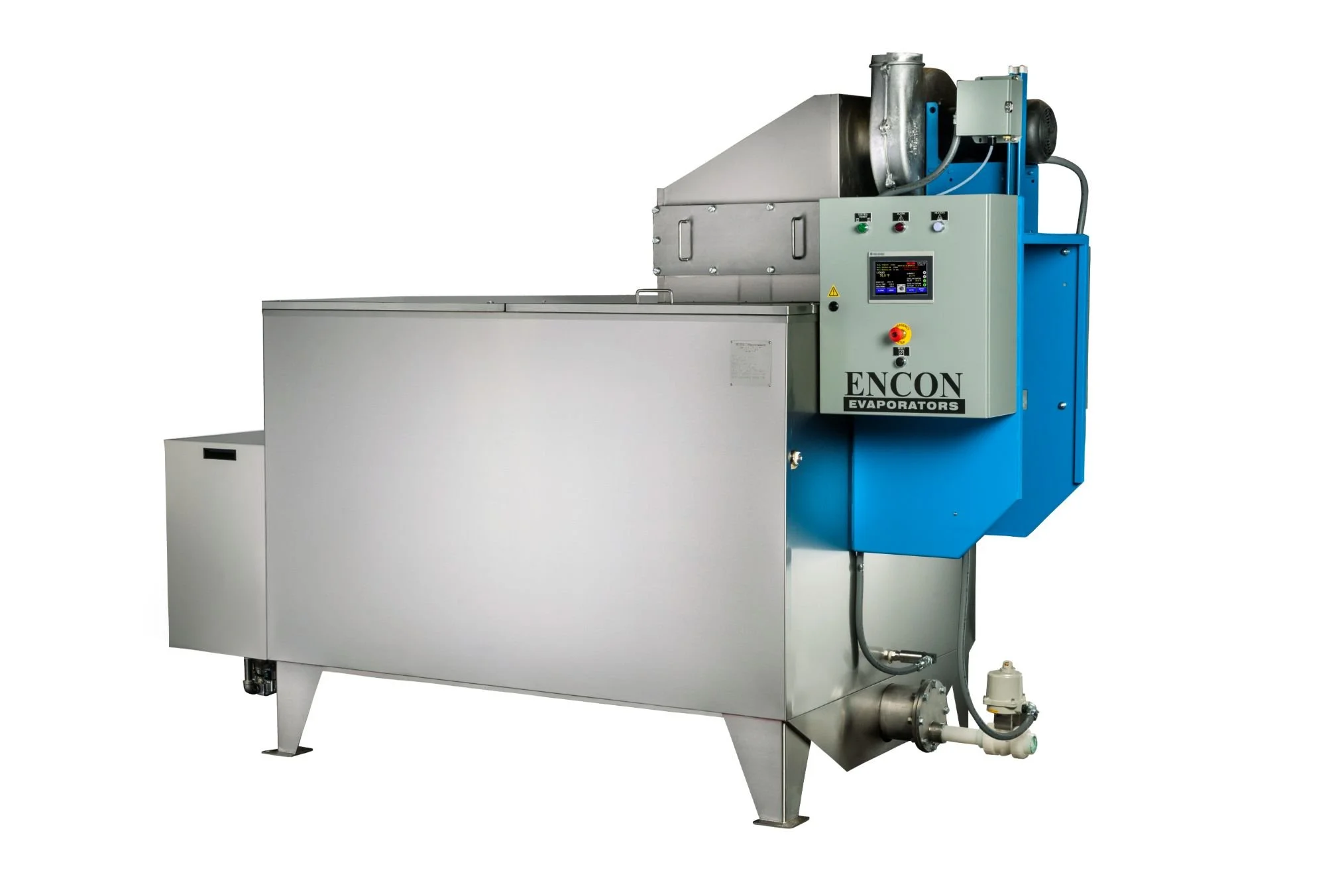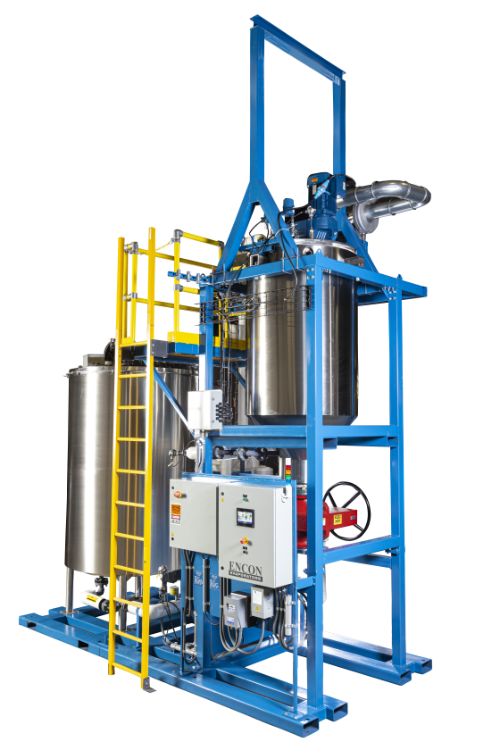Harnessing Evaporators to Minimize Waste Water Disposal in your Parts Cleaning and Metal Finishing Processes
In today's environmentally conscious world, industries face the challenge of managing waste water generated during aqueous washing processes effectively. These processes involve using water-based cleaning solutions, condensing wash chemicals, and dealing with slurry from mass finishing equipment, all contributing to significant waste water production. However, there is a powerful solution that can address these concerns head-on: the implementation of evaporators. Let's explore how evaporators can improve waste water disposal by offering environmental benefits, cost savings, and ease of use.
The Need for Effective Waste Water Disposal:
Industries such as automotive, aerospace, electronics, and metal fabrication heavily rely on aqueous washing processes to clean their components and surfaces. While this approach is effective, it generates a substantial amount of waste water containing contaminants like oils, greases, and dissolved solids. Improper disposal of this waste water can lead to environmental contamination, regulatory violations, and increased costs.
The Role of Evaporators in Waste Water Minimization: Evaporators provide a sustainable and efficient solution to minimize waste water disposal in aqueous washing processes. By utilizing evaporation technology, these systems remove water from the waste stream, leaving behind concentrated contaminants that can be managed or disposed of responsibly. The water is treated and recycled, reducing the overall waste volume.
Condensing Industrial Part Washing Chemicals with Evaporators:
Evaporators offer an additional benefit by condensing and recovering wash chemicals used in the cleaning process. By operating at low temperatures, these systems allow for the recovery of valuable cleaning agents like detergents and surfactants. This not only reduces the procurement costs but also promotes sustainability by minimizing chemical waste.
To optimize the efficiency and effectiveness of the aqueous washing process, integrating evaporators is essential. By seamlessly integrating evaporators with the entire aqueous washing process, businesses can maximize the benefits of waste water minimization and resource recovery. M Whether the aqueous washing process involves batch cleaning systems, spray washers, or other specialized equipment, incorporating evaporators makes the disposal process more efficient. The evaporators can be seamlessly connected to the waste water outlet of the cleaning equipment, effectively treating the waste water by removing excess water and concentrating the contaminants.
Using Evaporators to treat slurry from Mass Finishing/Vibratory Finishing Systems:
In addition to aqueous washing processes, evaporators also play a crucial role in waste water minimization in mass finishing or vibratory finishing systems. These processes generate a significant amount of slurry, consisting of water, abrasive media, and metal fines. Managing and disposing of this slurry can be a challenge.
By incorporating evaporators into mass finishing systems, businesses can effectively address the slurry management issue. Evaporators reduce the water content of the slurry, significantly minimizing the volume of waste for disposal. The concentrated sludge left behind is easier to handle and can be managed or recycled more efficiently. Moreover, the recovered water from the evaporators can be reused within the mass finishing system, minimizing water consumption and promoting sustainability.
Integrating evaporators into mass finishing systems is a seamless process. The evaporators can be connected to the waste water outlet of the system, and the operation can be automated for continuous and efficient waste water treatment. The customization options allow for adapting to different slurry compositions, flow rates, and water chemistries.
Encon Evaporators - Slurry Dryer
Reducing slurry from your mass finishing and vibratory finishers.
By integrating evaporators into the aqueous washing process or mass finishing slurry, a businesses can optimize the utilization of resources. The recovered water can be recycled back into the cleaning equipment, reducing water consumption and conserving this valuable resource. The concentrated contaminants can be more efficiently managed or disposed of responsibly, further minimizing the environmental impact. The evaporators can be customized to meet the specific requirements of the process, accommodating different flow rates, water chemistries, and operational demands.
Environmental Impact and Cost Savings:
Implementing evaporators in for your cleaning/finishing processes offers significant environmental benefits. By reducing waste water volume, businesses contribute to water conservation efforts and minimize their ecological footprint. The condensing and reuse of wash chemicals reduce chemical waste and associated environmental risks. These sustainable practices align with corporate social responsibility goals.
In addition to the environmental advantages, evaporators provide substantial cost savings. By minimizing water usage, companies reduce water supply costs, wastewater treatment expenses, and potential fines for non-compliance with regulations. Recovering and reusing wash chemicals also lowers the need for frequent purchases, resulting in significant cost reductions in chemical procurement.
Ease of Use and Integration: Evaporators are designed to be user-friendly and seamlessly integrated into existing aqueous washing processes. They can be tailored to meet specific operational requirements and automated for uninterrupted operation. Once installed, evaporators require minimal maintenance and can operate continuously, ensuring smooth production and waste water management.
Conclusion:
The integration of evaporators with the aqueous washing process represents a significant advancement in waste water minimization and resource recovery. By seamlessly incorporating evaporators into the system, businesses can maximize the environmental benefits, cost savings, and operational efficiency associated with waste water management.
Through this integration, the aqueous processes becomes more sustainable, reduced water consumption, minimized waste water generation, and enhanced utilization of resources. Moreover, the streamlined workflow ensures a seamless operation, optimizing productivity and minimizing downtime.
Embracing the integration of evaporators with the aqueous processed demonstrates a commitment to environmental stewardship and responsible manufacturing practices. By harnessing the power of evaporators, businesses can achieve a more sustainable and efficient approach to waste water disposal, contributing to a greener future for our planet.


